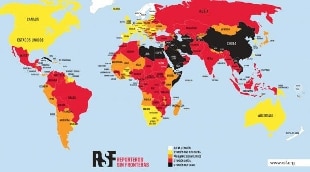Share
April 24, 2021 Disinformation virus attacks press freedom in Latin America. This is the analysis of the annual report Reporters Without Borders (RSF) 2021, which reveals a general deterioration of the situation on the continent, with "rare exceptions". The working environment of journalists, already hostile and difficult before the coronavirus crisis, has become increasingly harmful and toxic, further deteriorating the situation and paving the way for a future of censorship. Distrust of information - the report underlines - feeds on the anti-media rhetoric of the Latin American political class, whose aggressiveness is growing.
The document, which annually assesses the press freedom situation in 180 countries around the world, reveals that journalism is facing impediments in 73 nations and is facing obstacles in another 59, which together represent 73% of the territories assessed. The pandemic served as an "accelerator for censorship" - declared Christophe Deloire, general secretary of RSF - justified "serious difficulties in accessing information, confiscation of journalistic material, with the refusal often by presidential officials to submit to any type of question ".
Journalists have been publicly accused of exaggerating the severity of the health crisis and sowing panic in public spaces. Those who dared to question the authorities' official response on how to fight the pandemic were arrested, accused of practicing "disinformation terrorism" and, at times, imprisoned, as happened to Venezuelan independent journalist Darvinson Rojas, who in a tweet called into question the credibility of the official data.
According to the study, Brazil, Venezuela and El Salvador are classified as the nations where journalists report the most blockages or difficulties in accessing official information. El Salvador, where according to the report "journalists have great difficulty in obtaining official information on the management of the epidemic", fell eight places to finish in 82nd place.
Looking at the ranking of countries that do not respect press freedom, and which are currently placed in the black zone of the list, Cuba is in 171st position, qualified by the organization as the worst Latin American nation that manifests great hostility to the press.
The classification made by the NGO, whose report shows an increasing difficulty for journalists to investigate and report sensitive issues, measures access restrictions and strong impediments in the task of current news coverage, due - or under the pretext - of health crisis.
The question the organization is asking is: will they be freer when the pandemic ends?
#RSFIndex In Latin America, cases todos los indicadores están en rojo.
With algunas raras excepciones, el entorno laboral de los periodistas, que ya era hostil y complicado antes de la crisis del coronavirus, se ha deteriorado aún más https://t.co/voVTOqey3X
- RSF en español (@RSF_esp) April 20, 2021
However, one of the biggest concerns for RSF is in Brazil. There, in addition to the difficulties in accessing official information, journalists have to deal with the behavior of President Jair Bolsonaro. This landscape has led the largest nation in South America to drop four places from the 2020 report, currently ranking 111th in the field of freedom of expression. The investigation has long warned about the actions of Jair Bolsonaro and Venezuelan President Nicolás Maduro, holding them responsible for spreading false information, such as the case of promoting treatments against Covid-19 without referring to scientific support.
Venezuela ranks 148th in the ranking in 2021. The report is presented a few days after the Supreme Court of Justice issued a sentence in which it obliges the newspaper "El Nacional" to pay compensation to the deputy Diosdado Cabello of $ 13.6 million due to a defamation complaint filed in 2015.
The report also reveals concern in countries such as Chile (54), where, among other things, it denounces "spying by journalists"; in Argentina (69th place), which expresses concern about "the closure of the media and the growing precariousness of work"; in Colombia (134), a country in which, according to the report, harassment of journalists through the Internet is on the rise; and in Mexico (143), where in addition to violence against professionals, there is a stigmatization of the press "by public discourse".
RSF noted an increase in abusive legal proceedings against the press, generally undertaken by elected officials or state representatives, including Peru (91st), Haiti (87th) and Nicaragua. Ecuador appears in 96th place, orange in color, corresponding to the band that has "significant problems". Costa Rica (5) and Jamaica (7) are a separate case in the study presented by Reporters Without Borders; it is these "countries that look at the press with respect", despite the fact that, the NGO underlines, the situation is still delicate, being in a "region corroded by corruption, insecurity and daily fury against the press".

